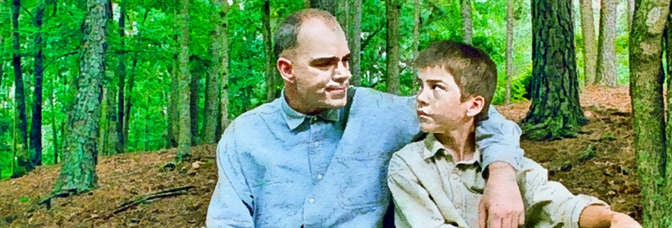I’m going to assume Sling Blade was a labor of love for actor/writer/director Billy Bob Thornton (remember how much of a big deal he used to be?), just because it has all the trappings of a labor of love. I watched the newish director’s cut DVD, which runs twenty-two minutes longer than the theatrical version at 148 minutes, and–to be fair to the theatrical cut, which I’m sure was a labor of love too–the film should be about ninety-eight minutes.
I kept thinking of a phrase while watching the film: “poorly executed.” Sling Blade has a lot of poorly executed scenes and sequences. There’s one particularly offending montage that I won’t go into, just in case anyone isn’t familiar with the conclusion. But the film has some beautiful, beautiful moments. Moments where tears came to my eyes (but didn’t escape, I’d be a lot more positive if they’d gotten away). Thornton creates these beautiful relationships–not just his character and the kid, but his character and everyone (except Dwight Yoakam’s character). It’s just when he fills in the moments with a lot of useless talk… a lot of labor of love moments.
Now, I was going to wait to talk about Dwight Yoakam, but I’m afraid I’ll forget the adjective for his acting if I do. Dwight Yoakam is atrocious. For the most part, Sling Blade looks like a “normal” motion picture. Miramax did not pay for it–it is from before Miramax paid for all their films–but it’s shot on 35 millimeter and the print doesn’t change film stocks or any other tell-tale signs… Except Yoakam. I presume Thornton and Yoakam were friends, because there’s no other reason someone would saddle down his or her film with such a crappy performance. Yoakam probably gets off six lines that aren’t cringe-inducing. Atrocious. That’s the right word….
Unfortunately, it’s also the right word to describe the musical score. A score doesn’t necessarily have to weigh down or improve a film, except Thornton relies on the score a few times for his terrible montages. Thornton holds shots too… there’s movement in them, but the shots hold for a long time, maybe even a minute. Hitchcock rarely went over twenty seconds. These lengthy, useless montages, with the terrible music–especially the end, after the character relationships have just produced this beautiful feeling in the viewer–are unspeakable. It’s a travesty.
I haven’t seen Sling Blade since 1996, when it came out in the theater, and I dutifully went and saw my “indie” movie. I read the screenplay previously and the screenplay, I remember, was better. The film doesn’t work, emotionally, for the same reason the Sixth Sense doesn’t work. The story is about this family and the filmmaker forces the story to be about an external force. It’s a loose comparison, but in the end of both, we’re cheated of the emotional impact, left instead with a gimmick–a nice little bow. With a nice pair of editing scissors, though, someone could Sling Blade into something really impressive.

Leave a Reply